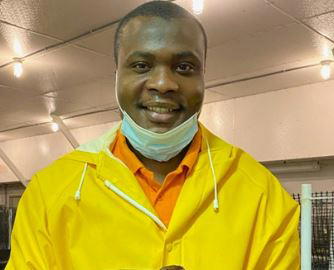
By Ayo Onikoyi
A leading expert in livestock genomics, Ridwan Ahmed, has unraveled the genetic basis of important traits in Rainbow trout, paving the way for improved fillet yield and quality in the aquaculture industry. Ahmed, a Ph.D. candidate at the University of Maryland, College Park, USA, is utilizing cutting-edge “omics” techniques to enhance aquaculture breeding programs.
Ahmed’s research focuses on leveraging genomics and metagenomics to optimize Rainbow trout breeding. His groundbreaking work has identified key genes and microbiome biomarkers associated with fillet color, a crucial factor in determining the quality and market value of the rainbow trout fillet.
Building on his previous genomic research on Nigerian indigenous cattle breeds, Ahmed aims to contribute to developing a robust breeding program for Nigeria’s livestock and aquaculture industry. “In this era of genomics, rapid genetic progress can be achieved through a well-structured breeding program, and Nigeria should not be left behind,” he emphasized. He has previously identified unique genetic polymorphisms that influence milk production and disease-resistance in Nigeria’s White Fulani and Muturu cattle breeds.
Ahmed’s innovative approach combines genomics, transcriptomics, and metagenomics analysis to improve fillet yield and quality traits in Rainbow trout. His research has been showcased at prominent conferences, including Aquaculture America 2024, Genomes of Animals and Plants 2023 (GAP ’23), and Plant and Animal Genome Conference 2023 (PAG 30).
One of Ahmed’s notable studies, “Gene Expression Signature and Genetic Polymorphism, and Microbiome Biomarkers Associated with Fillet Color in Rainbow Trout,” was presented at Aquaculture America 2024. This research highlights the potential of genetic and microbiome markers in predicting fillet color and how they can be used in improving breeding programs.
Ahmed has expertise in bioinformatics and genomic data analysis, utilizing several tools and software to estimate breeding values and make informed selection decisions. He is also proficient in using R and Python for genomic data analysis.
Ahmed’s research has significant implications for the global aquaculture industry, which faces increasing pressure to meet demand for high-quality seafood. By improving fillet yield and quality, Ahmed’s work can enhance the efficiency and sustainability of fish farming operations.
The applications of Ahmed’s research extend beyond the aquaculture industry. His findings on the genetic basis of fillet color can inform breeding programs for other livestock species, potentially improving meat quality and reducing waste.
As Ahmed completes his Ph.D. dissertation, he aims to continue advancing the field of livestock breeding and genomics. His research has the potential to drive innovation in Nigeria’s livestock and aquaculture industry, aligning with the country’s goals for agricultural development.
Ahmed’s expertise has been recognized through his many awards and role as Teaching and Research Assistant at the University of Maryland College Park. He is an awardee of the Commonwealth Shared Scholarship in the United Kingdom and the best graduating student in the Faculty of Agriculture and Forestry at the University of Ibadan (2015).
Ahmed’s commitment to mentoring the next generation of scientists is evident in his teaching and research endeavors. His passion for genomics and its applications in improving livestock and aquaculture is inspiring a new wave of researchers. The intersection of genomics, metagenomics, and breeding programs holds vast potential for improving food security and sustainability. Ahmed’s research serves as a model for interdisciplinary collaboration and innovative problem-solving.
As the global demand for high-quality seafood continues to rise, Ahmed’s work offers a promising solution. By unlocking the genetic basis of several economically important traits in Rainbow trout, he is paving the way for a more efficient, sustainable, and resilient aquaculture industry.
Moreover, Ahmed’s dedication to advancing genomics in Africa has sparked meaningful collaborations and knowledge sharing. His work embodies the potential for African scientists to lead innovations in agricultural development, addressing regional challenges and promoting global food security.
As he continues to push the boundaries of scientific discovery, his contributions will undoubtedly leave a lasting legacy in the field, inspiring future generations of researchers and scientists. He hopes to, in the nearest future, utilize his skills and knowledge to positively impact the Nigeria livestock industry.
Disclaimer
Comments expressed here do not reflect the opinions of Vanguard newspapers or any employee thereof.